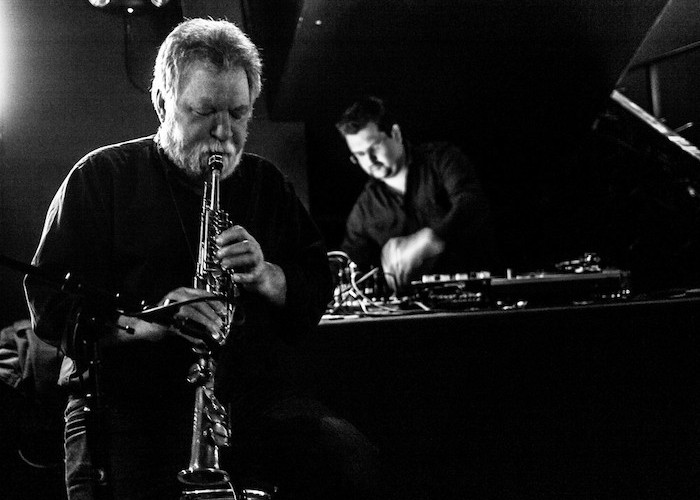Jan 13, 2026 2:09 PM
More Trump-Kennedy Center Cancellations
The fallout from the renaming of the John F. Kennedy Center for the Performing Arts to include President Donald…

Evan Parker (left) and Matthew Wright collaborate on Crepuscule In Nickelsdorf, one of two new albums Parker’s contributed to.
(Photo: Peter Gannushskin)Among the ranks of free-jazz artists, British saxophonist Evan Parker is one of the scene’s most vital players—and a veteran trailblazer still in forward motion.
More than a half century ago, he was a critical member in a radical thicket of innovators that included guitarist Derek Bailey, bassist Barry Guy and scads of other British improvisers. Parker, now 75, continues to assert a bold presence, and his vast discography recently has swelled with the addition of two new titles: one with the group Kinetic, Chiasm, and another with electronicist Matthew Wright, Crepuscule In Nickelsdorf.
Parker, known for his extended technical bravura and an abiding musicality, works well with others in the intimate setting of duos and, zooming out, with big-band projects—like his inventive Electro Acoustic ensembles. Despite the economic challenges of those bigger groups, he insisted that “my interest in large-ensemble improvisation remains undiminished.”
Parker recently spoke with DownBeat about his recent work, his pioneering past and an enduring link to the ECM imprint.
The following has been edited for length and clarity.
You qualify as a free-jazz pioneer. Early on, did you sense that you and your comrades in the “free” world were forging a new path—or just following a sense of natural evolution?
I think the “following a sense of natural evolution” is an accurate way of seeing things. The drive to find something original—a next step, if you like—was a central concern of the work back then with John Stevens, Paul Lytton, Derek Bailey and others.
These two recent recordings seem divergent. How would you compare the two, and does this represent a diversity you like in your music?
For me the “free” in free improvisation means to feel that I can go anywhere in response to the specifics of place and the collective imagination.
With Kinetic, I am an invited guest to play with an established piano-bass-drums trio with some of the weight of tradition and history behind such instrumentation. With [Crepuscule], I am a co-leader with Matthew Wright in designing specific structures and line-ups for particular situations.
You’ve delved into musical alliances beyond the usual free/experimental suspects: You might be the only musician to have played with both Bailey and Robert Wyatt, for instance. Were your ears and tastes always wide open to new possibilities?
I think it would be more accurate to say that I have sometimes been invited into other areas of music. Robert Wyatt is a very special and hard-to-categorize individual, but also a friend for many years. He educated my sons, as schoolboys, in music that was not represented in the records at home. His wife, Alfreda, was responsible for introducing me to John Stevens. We go back a long way.

Belá Fleck during an interview with Fredrika Whitfield on CNN.
Jan 13, 2026 2:09 PM
The fallout from the renaming of the John F. Kennedy Center for the Performing Arts to include President Donald…

Peplowski first came to prominence in legacy swing bands, including the final iteration of the Benny Goodman Orchestra, before beginning a solo career in the late 1980s.
Feb 3, 2026 12:10 AM
Ken Peplowski, a clarinetist and tenor saxophonist who straddled the worlds of traditional and modern jazz, died Feb. 2…

The success of Oregon’s first album, 1971’s Music Of Another Present Era, allowed Towner to establish a solo career.
Jan 19, 2026 5:02 PM
Ralph Towner, a guitarist and composer who blended multiple genres, including jazz — and throughout them all remained…

Rico’s Anti-Microbial Instrument Swab
Jan 19, 2026 2:48 PM
With this year’s NAMM Show right around the corner, we can look forward to plenty of new and innovative instruments…

Richie Beirach was particularly renowned for his approach to chromatic harmony, which he used to improvise reharmonizations of originals and standards.
Jan 27, 2026 11:19 AM
Richie Beirach, a pianist and composer who channeled a knowledge of modern classical music into his jazz practice,…